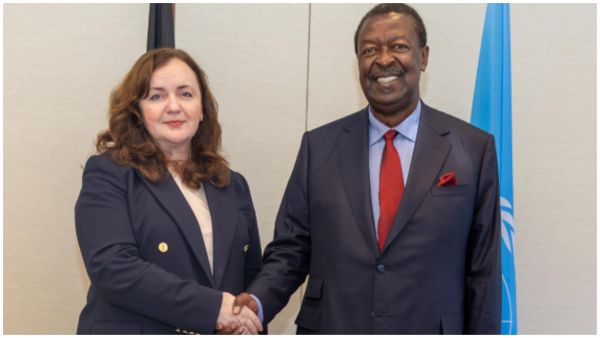UN counter-terrorism body partners with Kenya to combat digital terror networks

In a statement after the meeting with Natalia Gherman, Executive Director of UNCTED, Mudavadi said Kenya continues to stand firm in the face of persistent terrorist threats and is committed to strengthening national capacity to detect, disrupt, and deter terrorist activities.
Prime Cabinet Secretary Musalia Mudavadi has said Al-Shabaab remains the most significant threat to Kenya’s national and regional security as the country ramps up its fight against terrorism.
He has said the government is working with the United Nations Counter-Terrorism Executive Directorate (UNCTED) and other partners to stop terrorists from using technology, including artificial intelligence, for propaganda, recruitment, cyber-enabled crime, and drone-based attacks.
More To Read
- Rights experts sound alarm on AI’s potential to target activists, undermine electoral integrity
- Museveni clarifies Indian Ocean comments after Kenya downplayed war talk
- UN calls for legal safeguards for AI in healthcare
- Senators summon Mudavadi over harassment, detention and deaths of Kenyans abroad
- Kenya dismisses war fears as Mudavadi quashes claims of Uganda ‘overrunning’ the country
- Terrorism in Africa, a ‘growing global threat’
In a statement after the meeting with Natalia Gherman, Executive Director of UNCTED, Mudavadi said Kenya continues to stand firm in the face of persistent terrorist threats and is committed to strengthening national capacity to detect, disrupt, and deter terrorist activities.
“The Executive Director of UNCTED, Natalia Gherman, and I met to discuss advancing Kenya’s security priorities. We agreed on practical steps to strengthen our capacity to detect, disrupt and deter terrorists from exploiting digital platforms,” said Mudavadi.
"Kenya continues to stand firm in the face of persistent terrorist threats, with Al-Shabaab remaining the most significant challenge to our national and regional security."
He highlighted the importance of preventing cross-border attacks, which often involve improvised explosive devices, targeted assassinations, and ambushes that endanger both security personnel and civilians.
He commended UNCTED for supporting member states in implementing Security Council counter-terrorism resolutions and advancing global efforts against violent extremism.
He also emphasised the urgency of preventing cross-border attacks, which often involve improvised explosive devices, targeted assassinations and ambushes that endanger both security personnel and civilians.
Mudavadi highlighted the growing use of information and communication technologies for radicalisation, recruitment, financing and operational coordination by terrorist networks, calling for stronger collaboration to counter these evolving risks.
He reiterated Kenya’s commitment to disrupting terrorists’ use of encrypted messaging apps, social media platforms and mobile money services, ensuring technology serves as a shield for citizens rather than a weapon in the hands of extremists.
The Prime Cabinet Secretary emphasised that discussions with UNCTED focused on practical steps to strengthen Kenya’s counter-terrorism capacity and address emerging threats posed by advanced technologies.
He reaffirmed Kenya’s dedication to protecting its citizens and collaborating with international partners to tackle both traditional and emerging forms of terrorism.
Top Stories Today














































